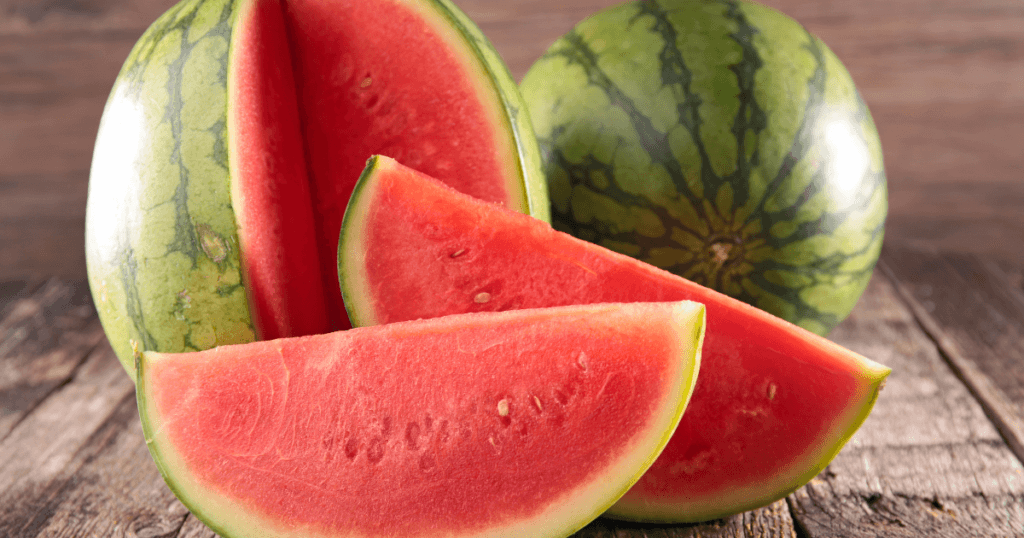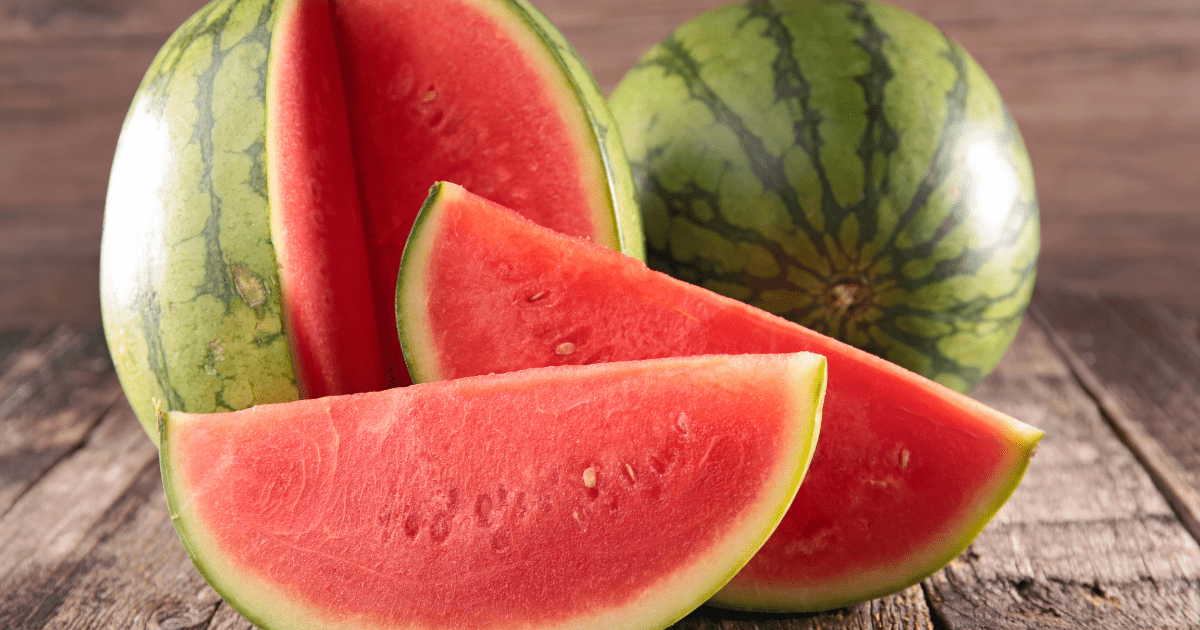Watermelon: Health Benefits, and Nutritional Richness
Hydration Hero: Discover how watermelon’s 92% water content replenishes and energizes, making it an ideal post-workout snack for optimal recovery
Watermelon, with its sweet and juicy allure, stands as an iconic symbol of summer. Initially perceived as a simple combination of sugar and water, this refreshing fruit reveals a surprising array of nutrients offering numerous potential health benefits.
Registered dietitian Lara Whitson, RD, LD, emphasizes that watermelon is not just a seasonal indulgence for barbecues and beach outings; it also boasts significant health advantages. Despite its lack of protein and iron, the nutritional value of watermelon should not be underestimated. Remarkably low in calories, it serves as a hydrating agent and a source of various nutrients essential for maintaining good health.

A single cup of diced watermelon, totaling a mere 46 calories, encompasses 0g of fat, 1mg of sodium, 9g of sugar, 10mg of calcium, 12mg of vitamin C, 15mg of magnesium, and 139g of water. It is also Heart-Check Certified by the American Heart Association, as it contains no fat, sodium, or cholesterol. Additionally, watermelon seeds, often discarded, carry benefits such as magnesium, iron, healthy fats, and zinc.
The nutritional richness extends further, with 170 milligrams of potassium per serving—an essential mineral supporting nerve and muscle function, as well as fluid balance in the body. Beyond these fundamental nutrients, watermelon provides noteworthy amounts of vitamin A, contributing to its overall health-promoting properties.
Antioxidants play a pivotal role in the health benefits of watermelon. Lycopene and cucurbitacin E, both found in watermelon, are known for their disease-fighting capabilities. Lycopene, responsible for the fruit’s vibrant red color, has been linked to protection against diseases such as cancer and diabetes.
The often-overlooked components of watermelon, namely the seeds and rinds, hold their own nutritional significance. Watermelon rinds, characterized by lower sugar and higher fiber content than the flesh, also contain citrulline. Meanwhile, watermelon seeds, whether consumed dried or raw, are rich in magnesium and folate—nutrients crucial for overall well-being. These seeds also contain fatty acids known for reducing bad cholesterol levels, aiding in cardiovascular health.
Lara Whitson suggests incorporating watermelon rinds into stir-fries with other vegetables and seasoning the seeds, akin to pumpkin seeds, for a healthful snack. The versatility of watermelon extends beyond its juicy flesh, making it a wholesome addition to various culinary creations.
Research indicates that melons, in general, contribute positively to health, but further studies are needed to elucidate the specific effects of watermelon on the body. Whitson outlines nine potential health benefits of watermelon, shedding light on its multifaceted positive impact.
Potential Benefits of Watermelon
- Hydration: Watermelon, composed of 92% water, offers an effortless way to stay hydrated. Even mild dehydration can lead to fatigue, muscle cramps, and headaches. Whitson recommends consuming watermelon with a sprinkle of salt after physical activity to replenish electrolytes and carbohydrates, restoring energy levels and quenching thirst effectively.
- Weight Management: With its high water content and low calorie count, watermelon can be a valuable component of a weight management plan. A 2019 study involving individuals considered overweight or obese revealed that those who replaced low-fat cookies with watermelon reported lower hunger, reduced desire to eat, and experienced positive effects on body weight, BMI, and waist-to-hip ratio.
- Disease Prevention: Early evidence suggests that regular consumption of watermelon may reduce the risk of chronic diseases, including diabetes, obesity, cardiovascular disease, and cancer. The antioxidants in watermelon, combating stress and preventing cell damage, contribute to its disease-fighting potential. Notably, watermelon surpasses other fruits and vegetables in lycopene content, making it a potent ally against various diseases.
- Eye Health: The nutrients present in watermelon, particularly antioxidants, play a crucial role in eye health. These antioxidants may prevent or delay the formation of cataracts and reduce the risk of age-related macular degeneration, a condition leading to blindness. The vitamin A content in watermelon further supports corneal health, with just one medium slice providing up to 11% of the daily recommended intake.
- Immune System Boost: Watermelon’s generous dose of vitamin C supports the immune system, aiding in the fight against germs and infections. The immune-boosting properties of vitamin C may also contribute to reducing the risk of cancer.
- Muscle Soreness Relief: The inclusion of watermelon or watermelon juice in one’s diet may aid in post-exercise recovery. This benefit is attributed to citrulline, a compound that enhances blood flow and muscle function while removing ammonia from the body. The reduction of lactate buildup during exercise minimizes muscle soreness.
- Skin Health: Vitamin C in watermelon plays a vital role in collagen production, supporting immune function, cell health, and injury recovery. Collagen provides strength and elasticity to the skin, aiding in the replacement of dead skin cells. Additionally, beta-carotene-derived vitamin A contributes to skin cell repair, preventing dryness and flaking. Vitamin B6 in watermelon may also play a role in preventing acne.
- Digestive Health: Plant compounds known as polyphenols in watermelon promote the growth of beneficial bacteria in the gut, facilitating digestion. This not only eases the digestive process but may also enhance immune function and the production of essential nutrients by the gut.
- Blood Sugar Management: Watermelon emerges as a favorable option for those seeking to manage blood glucose levels. With few carbs and a low glycemic load, watermelon minimally impacts blood sugar levels compared to other foods. This makes it a suitable choice for individuals aiming to enjoy a slice without experiencing a significant spike in blood sugar.
Side Effects
Despite these benefits, it’s essential to be mindful of potential side effects for certain individuals. Those prone to migraines, allergies to specific pollens, individuals with diabetes, and those with digestive issues such as irritable bowel syndrome (IBS) should exercise caution.
While enjoying watermelon in moderation is generally safe, extreme diets centered around a single food type, such as a watermelon cleanse, are discouraged. These restrictive diets may deprive the body of essential nutrients needed for proper functioning.
In conclusion, watermelon, with its affordability, versatility, and health-promoting properties, stands as a year-round culinary delight. Whether incorporated into smoothies, salads, frozen treats, or even grilled dishes, watermelon’s refreshing taste and nutritional richness make it a delightful and nutritious addition to any diet.
Sources:
Cleveland Clinic. (2023). Why Watermelon Should Be Part of Your Diet. (https://health.clevelandclinic.org/benefits-of-watermelon/). Accessed November 4, 2023
Wempen, K. (2021). Mayo Clinic Health Systems. The wonders of watermelon. (https://www.mayoclinichealthsystem.org/hometown-health/speaking-of-health/the-wonders-of-watermelon). Accessed November 3, 2023
Category
- Health Issues (72)
- Healthy Diet (48)
- Herbs for Health (11)
- Mental Health (33)
- Skin Care (20)

